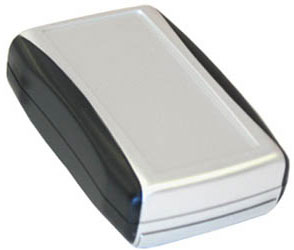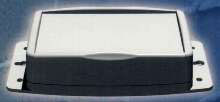 threatentification capabilities.
In addition to monitoring a range of radiological parameters, DNDS can export data through RF, BlueTooth, IRDA, Ethernet, or other communication protocols. System configurations and alarm detection levels may be adjusted remotely in either a wireless or hardwire setup. If the installation demands, the DNDS can be powered by a small battery for several days while it monitors radiation and stores spectroscopic information. The self-contained module has a number of options which can be tailored to a specific application—regardless of whether the system is in development or already in place. Robust circuit design coupled with an on-board micro controller allows for customization that only a standalone system would typically feature. The system can then operate as a standalone sensor or within a self organizing threat detection network. Our goal has been to understand and overcome the challenges of making radiological systems work under varied circumstances and sometimes extreme weather conditions, providing the lowest possible number of false and nuisance alarms while maintaining a very high probability of detection and low vulnerability to defeat. No matter what the application, our device provides critical time and data required for law enforcement to react appropriately to the threat before assets are at risk. “The universal compatibility of our DNDS module makes it a natural addition to currently operating monitoring systems,” noted company President David Brown. “Installation of the DNDS module into existing security systems is a positive step toward more complete homeland security monitoring with minimal investment and installation challenges.”
threatentification capabilities.
In addition to monitoring a range of radiological parameters, DNDS can export data through RF, BlueTooth, IRDA, Ethernet, or other communication protocols. System configurations and alarm detection levels may be adjusted remotely in either a wireless or hardwire setup. If the installation demands, the DNDS can be powered by a small battery for several days while it monitors radiation and stores spectroscopic information. The self-contained module has a number of options which can be tailored to a specific application—regardless of whether the system is in development or already in place. Robust circuit design coupled with an on-board micro controller allows for customization that only a standalone system would typically feature. The system can then operate as a standalone sensor or within a self organizing threat detection network. Our goal has been to understand and overcome the challenges of making radiological systems work under varied circumstances and sometimes extreme weather conditions, providing the lowest possible number of false and nuisance alarms while maintaining a very high probability of detection and low vulnerability to defeat. No matter what the application, our device provides critical time and data required for law enforcement to react appropriately to the threat before assets are at risk. “The universal compatibility of our DNDS module makes it a natural addition to currently operating monitoring systems,” noted company President David Brown. “Installation of the DNDS module into existing security systems is a positive step toward more complete homeland security monitoring with minimal investment and installation challenges.”  The rugged design of DNDS allows for installation in extreme environments so its watertight, dustproof, and shock resistant design allows the sensors to be deployed in areas in which accurate radiological monitoring has historically been a challenge. Background subtraction technology greatly reduces false positive alarms and self-diagnostics ensure minimal maintenance downtime.In late 2004, the National Intelligence Council confirmed that “undetected smuggling has occurred, and we are concerned about the total amount of [nuclear and radiological] material that could have been diverted or stolen” from sites around the world. The International Atomic Energy Agency (IAEA), which has documented 650 cases of trafficking since 1993, echoed that report. While billions of dollars have been spent on biological countermeasures, nuclear detection efforts have lagged. Critics say the Department of Homeland Security (DHS) is not moving fast enough to install a multilayered defense against one of its biggest security threats: the sheer volume of radiological materials, the whereabouts of which are unknown. The DNDS module provides an unprecedented opportunity to rapidly and unobtrusively begin radiological screening at any location with a system in place to screen for other threat types. About Berkeley Nucleonics Headquartered in San Rafael, California, and founded in 1963, Berkeley Nucleonics Corporation is an internationally recognized pioneer in the development of precision test and measurement instrumentation and real-time radiation detection, surveillance and measurement equipment. Technical Contact: Will Whitehorn Berkeley Nucleonics Corporation 800-234-7858 ext. 281 will@berkeleynucleonics.com
The rugged design of DNDS allows for installation in extreme environments so its watertight, dustproof, and shock resistant design allows the sensors to be deployed in areas in which accurate radiological monitoring has historically been a challenge. Background subtraction technology greatly reduces false positive alarms and self-diagnostics ensure minimal maintenance downtime.In late 2004, the National Intelligence Council confirmed that “undetected smuggling has occurred, and we are concerned about the total amount of [nuclear and radiological] material that could have been diverted or stolen” from sites around the world. The International Atomic Energy Agency (IAEA), which has documented 650 cases of trafficking since 1993, echoed that report. While billions of dollars have been spent on biological countermeasures, nuclear detection efforts have lagged. Critics say the Department of Homeland Security (DHS) is not moving fast enough to install a multilayered defense against one of its biggest security threats: the sheer volume of radiological materials, the whereabouts of which are unknown. The DNDS module provides an unprecedented opportunity to rapidly and unobtrusively begin radiological screening at any location with a system in place to screen for other threat types. About Berkeley Nucleonics Headquartered in San Rafael, California, and founded in 1963, Berkeley Nucleonics Corporation is an internationally recognized pioneer in the development of precision test and measurement instrumentation and real-time radiation detection, surveillance and measurement equipment. Technical Contact: Will Whitehorn Berkeley Nucleonics Corporation 800-234-7858 ext. 281 will@berkeleynucleonics.com
Subscribe to the DPJ Weekly Brief newsletter:
Subscribe
